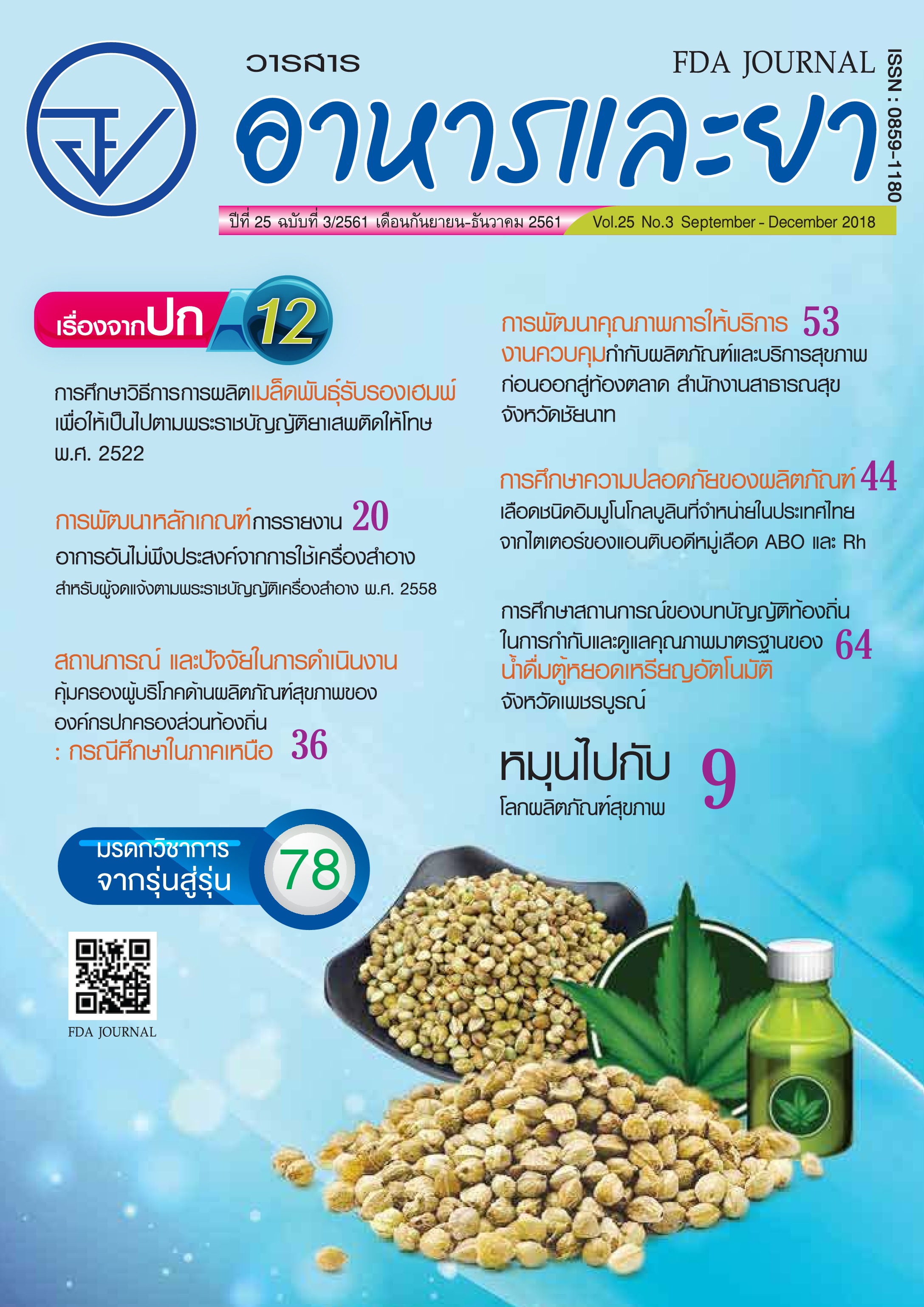การศึกษาสถานการณ์ของบทบัญญัติท้องถิ่นในการกำกับและดูแลคุณภาพมาตรฐานของ น้ำดื่มตู้หยอดเหรียญอัตโนมัติจังหวัดเพชรบูรณ์
Main Article Content
บทคัดย่อ
ปัจจุบันน้ำดื่มจากตู้น้ำดื่มหยอดเหรียญอัตโนมัติเป็นทางเลือกที่ผู้บริโภคนิยมมากขึ้น จากการสำรวจคุณภาพน้ำดื่มตู้หยอดเหรียญจังหวัดเพชรบูรณ์โดยหน่วยเคลื่อนที่เพื่อความปลอดภัยด้านอาหาร ปี 2559 – 2560 พบผ่านเกณฑ์ตามประกาศกระทรวงสาธารณสุขว่าด้วยน้ำบริโภคในภาชนะบรรจุที่ปิดสนิทเพียงร้อยละ 12.73 การควบคุมกิจการตู้น้ำดื่มหยอดเหรียญอัตโนมัติเป็นภารกิจขององค์กรปกครองส่วนท้องถิ่น (อปท.) ต้องออกบทบัญญัติท้องถิ่นโดยอาศัยพระราชบัญญัติการสาธารณสุข พ.ศ. 2535 ปัจจุบันพบว่ามีเพียง 12 แห่ง จาก 127 อปท. (ร้อยละ 9.45) ที่มีบทบัญญัติดังกล่าวแล้วในจังหวัดเพชรบูรณ์
การศึกษาครั้งนี้เป็นการศึกษาเชิงสำรวจและวิเคราะห์ในจังหวัดเพชรบูรณ์ โดยใช้แบบสอบถามสำรวจปัจจัยที่มีผลต่อการออกบทบัญญัติท้องถิ่นเพื่อควบคุมกิจการตู้น้ำดื่มหยอดเหรียญอัตโนมัติ เก็บข้อมูลจากผู้บริหารและผู้รับผิดชอบตู้น้ำดื่มหยอดเหรียญ จาก อปท. ทั้ง 12 แห่งๆ ละ 3 คน และเปรียบเทียบคุณภาพของน้ำดื่มตู้หยอดเหรียญอัตโนมัติ ปี 2559 – 2561 ระหว่างพื้นที่ที่มีบทบัญญัติท้องถิ่นแล้วกับพื้นที่ที่ยังไม่มีบทบัญญัติ
ผลการศึกษาพบว่า ปัจจัยที่มีผลต่อการตราบทบัญญัติท้องถิ่น 3 อันดับแรก ได้แก่ ผลกระทบต่อสุขภาพที่อาจเกิดขึ้นเมื่อได้รับน้ำดื่มที่ปนเปื้อนและต้องการให้เกิดการบังคับใช้กฎหมายกับน้ำดื่มที่ตกมาตรฐาน ร้อยละ 100 สถานที่/ลักษณะการติดตั้งหรือความมิดชิดของหัวจ่าย ณ ตู้น้ำดื่มหยอดเหรียญที่อาจส่งผลต่อคุณภาพน้ำดื่ม นโยบายขององค์กรต่อการออกบทบัญญัติ และประชาชนต้องการให้ภาครัฐดูแล ร้อยละ 97.14 และการไม่พบการแสดงฉลากระบุการดูแลตู้น้ำหยอดเหรียญ ร้อยละ 94.29 ในส่วนของคุณภาพน้ำดื่มตู้หยอดเหรียญอัตโนมัติ ปี 2559 – 2561 ในพื้นที่ที่มีบทบัญญัติท้องถิ่นแล้วพบว่า ไม่แตกต่างจากพื้นที่ที่ยังไม่มีบทบัญญัติ ที่เป็นเช่นนี้เนื่องจากไม่มีการบังคับใช้บทบัญญัติอย่างเคร่งครัด หรือมีข้อจำกัดในเรื่องของการบังคับใช้ ดังนั้น ต้องกระตุ้นให้แต่ละท้องถิ่นตระหนักถึงความสำคัญและประโยชน์ของการมีบทบัญญัติ รวมถึงประโยชน์ที่ประชาชนจะได้รับเมื่อมีการบังคับใช้ ต้องสร้างความตระหนักกับเจ้าของกิจการให้เห็นถึงความสำคัญของการดูแลตู้น้ำหยอดเหรียญ และให้ความรู้เกี่ยวกับการเลือกใช้ตู้น้ำดื่มหยอดเหรียญอัตโนมัติแก่ประชาชน เพื่อลดผลกระทบต่อสุขภาพที่อาจเกิดขึ้น
Article Details

อนุญาตภายใต้เงื่อนไข Creative Commons Attribution 4.0 International License.
เอกสารอ้างอิง
World Health Organization. (2017). Drinking-water Fact Sheet. [ออนไลน์]. เข้าถึงข้อมูลวันที่ 20 พฤศจิกายน 2560 จาก http://www.who.int/mediacentre/factsheets/fs391/en/
สำนักสุขาภิบาลอาหารและน้ำ กรมอนามัย. (2560). สถานการณ์คุณภาพน้ำบริโภคในประเทศไทย ปี 2551 – 2559. [ออนไลน์]. เข้าถึงข้อมูลวันที่ 20 พฤศจิกายน 2560 จาก http://foodsan.anamai.moph.go.th/ewtadmin/ewt/foodsan/download/D_Water/2016/water_51-59.pdf
กระทรวงสาธารณสุข. (2524, 7 กันยายน). ประกาศกระทรวงสาธารณสุข (ฉบับที่ 61) พ.ศ. 2524 เรื่อง น้ำบริโภคในภาชนะบรรจุที่ปิดสนิท.
กระทรวงสาธารณสุข. (2534, 26 กุมภาพันธ์). ประกาศกระทรวงสาธารณสุข (ฉบับที่ 135) พ.ศ. 2534 เรื่อง น้ำบริโภคในภาชนะบรรจุที่ปิดสนิท (ฉบับที่ 2).
กระทรวงสาธารณสุข. (2553, 23 เมษายน). ประกาศกระทรวงสาธารณสุข เรื่อง น้ำบริโภคในภาชนะบรรจุที่ปิดสนิท (ฉบับที่ 6).
กระทรวงสาธารณสุข. (2556, 17 กันยายน). ประกาศกระทรวงสาธารณสุข (ฉบับที่ 362) พ.ศ. 2556 เรื่อง น้ำบริโภคจากตู้น้ำดื่มอัตโนมัติ.
สำนักระบาดวิทยา กรมควบคุมโรค. (2560). สรุปรายงานการเฝ้าระวังโรค ประจำปี 2559 (พิมพ์ครั้งที่ 1), หน้า 126.กรุงเทพมหานคร : โรงพิมพ์ชุมนุมสหกรณ์การเกษตรแห่งประเทศไทย จำกัด.
กรมอนามัย. (2558). แนวทางการปฏิบัติตามพระราชบัญญัติการสาธารณสุข พ.ศ. 2535. (พิมพ์ครั้งที่ 4), หน้า 12. กรุงเทพมหานคร : โรงพิมพ์ชุมนุมสหกรณ์การเกษตรแห่งประเทศไทย จำกัด.


